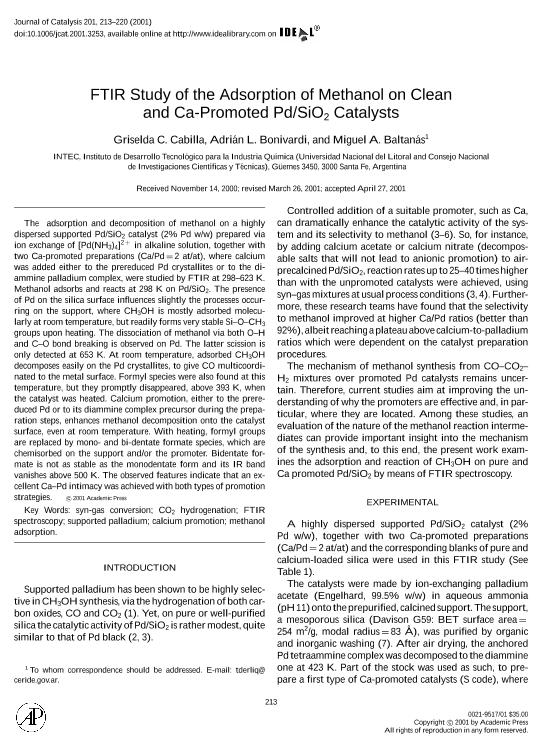Artículo
FTIR Study of the Adsorption of Methanol on Clean and Ca-promoted Pd/SiO2 Catalysts.
Fecha de publicación:
05/2001
Editorial:
Academic Press Inc Elsevier Science
Revista:
Journal of Catalysis
ISSN:
0021-9517
Idioma:
Inglés
Tipo de recurso:
Artículo publicado
Clasificación temática:
Resumen
The adsorption and decomposition of methanol on a highly dispersed supported Pd/SiO2 catalyst (2% Pd w/w) prepared via ion exchange of [Pd(NH3)4]2+ in alkaline solution, together with two Ca-promoted preparations (Ca/Pd=2 at/at), where calcium was added either to the prereduced Pd crystallites or to the diammine palladium complex, were studied by FTIR at 298–623 K. Methanol adsorbs and reacts at 298 K on Pd/SiO2. The presence of Pd on the silica surface influences slightly the processes occurring on the support, where CH3OH is mostly adsorbed molecularly at room temperature, but readily forms very stable Si–O–CH3 groups upon heating. The dissociation of methanol via both O–H and C–O bond breaking is observed on Pd. The latter scission is only detected at 653 K. At room temperature, adsorbed CH3OH decomposes easily on the Pd crystallites, to give CO multicoordinated to the metal surface. Formyl species were also found at this temperature, but they promptly disappeared, above 393 K, when the catalyst was heated. Calcium promotion, either to the prereduced Pd or to its diammine complex precursor during the preparation steps, enhances methanol decomposition onto the catalyst surface, even at room temperature. With heating, formyl groups are replaced by mono- and bi-dentate formate species, which are chemisorbed on the support and/or the promoter. Bidentate formate is not as stable as the monodentate form and its IR band vanishes above 500 K. The observed features indicate that an excellent Ca–Pd intimacy was achieved with both types of promotion strategies.
Palabras clave:
Palladium
,
Methanol
,
Calcium Promotion
Archivos asociados
Licencia
Identificadores
Colecciones
Articulos(INTEC)
Articulos de INST.DE DES.TECNOL.PARA LA IND.QUIMICA (I)
Articulos de INST.DE DES.TECNOL.PARA LA IND.QUIMICA (I)
Citación
Cabilla, Griselda; Bonivardi, Adrian Lionel; Baltanas, Miguel Angel; FTIR Study of the Adsorption of Methanol on Clean and Ca-promoted Pd/SiO2 Catalysts.; Academic Press Inc Elsevier Science; Journal of Catalysis; 201; 5-2001; 213-220
Compartir
Altmétricas




